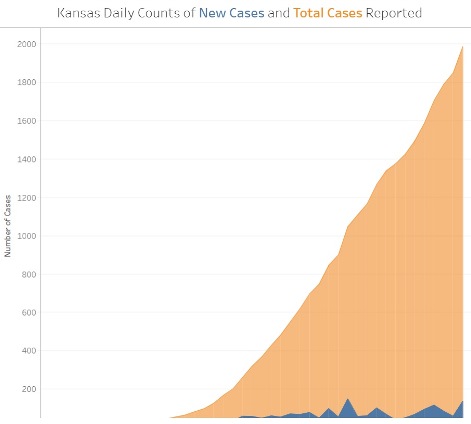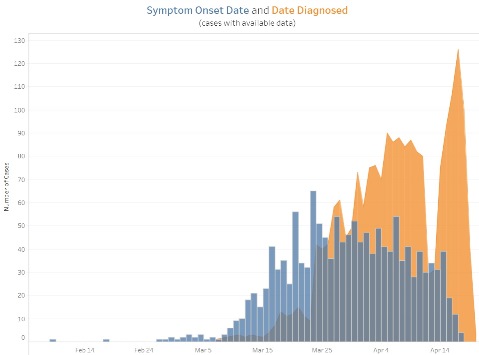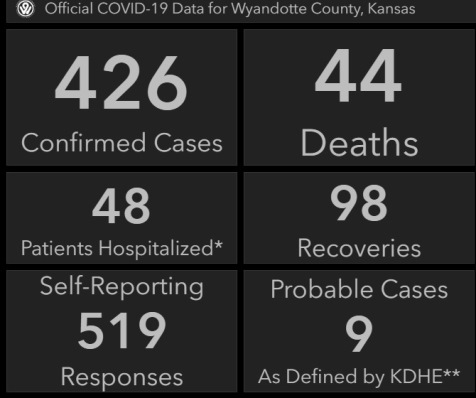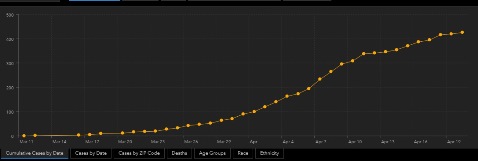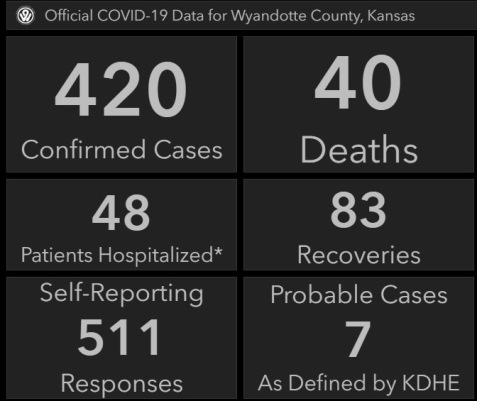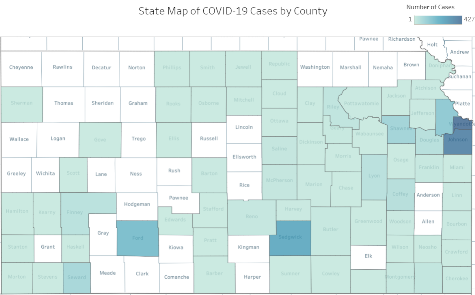
One of the new deaths over the weekend from COVID-19 was related to a church cluster of cases in Wyandotte County, according to state health officials.
A local pastor died over the weekend after a fight with COVID-19 that started in late March.
There now are 100 Kansans who have died, an increase of eight since Sunday, Gov. Laura Kelly said today. There was an increase of 137 positive COVID-19 cases since Sunday, to 1,986. Sixty-nine counties have reported positive cases.
The number of positive COVID-19 cases in Wyandotte County rose to 426, according to the 2:35 p.m. Unified Government Health Department report. Wyandotte County deaths rose to 44, according to the afternoon report. It was an increase of seven from 37 deaths reported on Sunday.
“I recognize that we are talking about Kansans,” Gov. Kelly said at the news conference Monday. “Someone’s mom, someone’s husband, someone’s friend, I don’t ever forget these are real people, not just numbers.”
Dr. Lee Norman, secretary of Kansas Department of Health and Environment, said today there were five clusters of cases that were related to religious gatherings in Kansas.
The Wyandotte County death over the weekend was part of a cluster with 51 cases and seven deaths from one religious meeting, he said. That meeting was held before the local stay-at-home order went into effect.
In all, the state is monitoring 39 clusters of cases, Dr. Norman said.
From the 39 clusters, the state has had 634 positive cases, 111 hospitalizations and 56 deaths, he said.
The clusters included 14 long-term care facilities, two group living arrangements, Lansing Correctional Facility, two health care facilities, five religious gatherings and 15 private companies, Dr. Norman said.
On Saturday night, a federal judge ruled that two churches that sued the state, one in Junction City and another in Dodge City, could temporarily meet despite the governor’s order limiting church services to 10 and fewer people. A temporary restraining order on the governor’s executive order, for those two churches only, was put in place until the judge can hear a motion later this week. The ruling did not apply to any other churches in the state.
Dr. Norman said he was not enthusiastic about the judge’s ruling.
“The question is, the judge not only acted in a judicial manner, but made public health recommendations,” Dr. Norman said. “In reality, if we were living in a more liberalized world as we start to turn the lights back on, and go back toward social distancing, they would be recommendations that down the road, in a continuum of time, would be sensible recommendations to make. But they are not sensible recommendations right now.”
On the question of public protests, Dr. Norman said the only good thing is they’re outdoors and it’s breezy. However, he believes people often are too close together in protests.
A group may be planning to demonstrate this week in Topeka. Another group was protesting Monday in Kansas City, Missouri. Gov. Kelly said she is a big believer in free speech, and as long as they are in groups of 10 or fewer, six feet apart, they have every right. However, she said it would not distract her from what she needs to do, which is to protect the health and safety of all Kansans and prepare a detailed plan to reopen when it is time.
Gov. Kelly said she understands many residents feel impatient for life to return to normal, and everyone wants to return to normal as soon as they can. Testing and contact tracing will be part of the steps necessary to reopen. Her administration will reach out to health and business leaders this week as they work on the transition, she said.
“The saga of coronavirus has been compared to a war,” Gov. Kelly said, “it’s been compared to a natural disaster, it’s been compared to the great recession. But the truth is, what we face today is all of those things and none of those things at the exact same time. We’ve never shut down the global economy for weeks at a time to fight a new highly infectious disease for which there is no cure. What we do know is that if we move forward prematurely, if we do not insure all of the health indicators, testing supplies and contact capacity are at robust sustainable levels before we transition back, then we will inevitably find ourselves facing a second wave.”
While the financial figures were not in yet, Gov. Kelly said she expected that they will start to see the effect of having shuttered large parts of the economy.
Gov. Kelly announced that Kansas has received additional personal protective equipment for southwest Kansas, after she discussed the need for additional equipment and testing supplies with President Trump last Thursday. The supplies and equipment will go to Finney, Ford, Lyon and Seward counties.
There are some outbreaks in communities with meat processing plants in western Kansas, in the Dodge City area, and they also are concerned about a meat processing facility in the Emporia, Kansas, area. The facilities have modified production and shipping procedures, she said. There has been an increase in temperature and health screenings, enhanced sanitation and social distancing. Ford County, where Dodge City is located, reported 180 positive COVID-19 cases on Monday.
According to state officials, the plants in southwest Kansas account for 25 to 30 percent of the country’s beef processing.
Kansas received additional testing equipment and personal protective equipment that will be used in western Kansas, Gov. Kelly said. She said both Sen. Pat Roberts and Sen. Moran had been invaluable advocates for the state in Washington, D.C.
They also are working with federal agencies on a long-term state testing plan.
Gov. Kelly said some of the personal protective equipment coming in from private donors did not go through the state office, but was sent directly to local hospitals. She said the state needed to know the numbers of protective equipment on hand in order to know what is needed to order in the future.
In other areas of the state, Johnson County reported 377 cases; Sedgwick County (Wichita area), 248; Leavenworth County, 135; Shawnee County (Topeka area), 92; Seward County, 79; Coffey County, 47; Douglas County (Lawrence area), 43; Lyon County, 39; Finney County, 38; and Riley County (Manhattan area), 26.
To see the governor’s news conference, visit https://www.facebook.com/GovLauraKelly/videos/521688092071137/.
The Kansas COVID-19 resource page is at https://govstatus.egov.com/coronavirus.
The UG’s COVID-19 webpage is athttps://alpha.wycokck.org/Coronavirus-COVID-19-Information.
